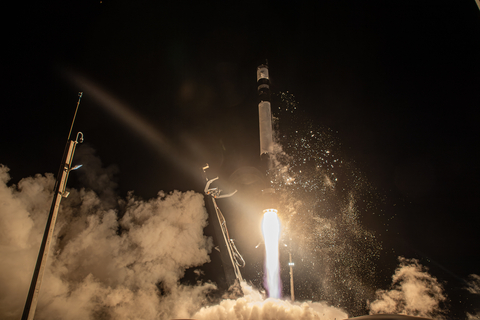Rocket Lab Successfully Launches Mission Designed to Investigate Removing Space Junk from Orbit
Rocket Lab’s Electron rocket successfully deployed the ADRAS-J satellite for Astroscale Japan Inc to conduct an orbital debris inspection demonstration mission.
MAHIA,

Rocket Lab's Electron launch vehicle lifts-off for the 'On Closer Inspection' mission for Astroscale Japan. (Photo: Business Wire)
The mission, named “On Closer Inspection”, launched from Pad B at Rocket Lab’s Launch Complex 1 in
Following the successful launch on Electron, the 150-kilogram ADRAS-J satellite will now approach an aged, derelict rocket stage in orbit to observe it closely, understand how it behaves and determine potential methods for its assisted deorbiting in future. The rocket stage it will be observing is the Japanese H-2A upper stage left in low Earth orbit after the launch of the GOSAT Earth observation satellite in 2009. ADRAS-J will fly around the stage, 11 meters long and four meters in diameter, inspecting it with cameras and sensors. Astroscale’s full mission will take between three and six months to complete.
“Congratulations to the Astroscale team on this historic mission that paves the way for new and innovative ways to reduce orbital debris and ensure space remains safely accessible,” said Rocket Lab founder and CEO Peter Beck. “It’s a real honor to provide a dedicated launch service and enable the kind of precise orbital maneuvers required for an advanced mission like this.”
To enable the ADRAS-J satellite to rendezvous with the derelict H-2A upper stage in orbit, Rocket Lab had to design a mission with strict launch timing and precision orbital deployment parameters. Rocket Lab only received the final perigee, apogee, and inclination from Astroscale 20 days before launch, parameters that are typically determined many months in advance of a launch. Only then could argument of perigee targets for different days within the launch window be selected, essentially determining the timing of Electron Kick Stage burns to facilitate the unique elliptical orbit required depending on the launch date. The mission demanded highly accurate orbital insertion with tighter margins than required on most standard missions. The exact T-0 was only able to be defined the day prior to launch and the required LTAN accuracy only allows for +/- 15 seconds, demonstrating Rocket Lab’s capability to deliver rapid and responsive advanced guidance, navigation and control analysis.
“Today’s successful launch of ADRAS-J marks another milestone toward our efforts to grow the on-orbit servicing sector while creating a sustainable space environment,” said Astroscale founder & CEO Nobu Okada. “We are grateful for the collaboration with Rocket Lab, whose expertise in dedicated launch services has been instrumental to the start of this ground breaking mission.”
Images and video from the launch of ‘On Closer Inspection’ are available for download here: https://flic.kr/s/aHBqjBdtqX
‘On Closer Inspection’ was Rocket Lab’s second launch of 2024 and the Company’s 44th Electron launch overall.
+ About Rocket Lab
Founded in 2006, Rocket Lab is an end-to-end space company with an established track record of mission success. We deliver reliable launch services, satellite manufacture, spacecraft components, and on-orbit management solutions that make it faster, easier, and more affordable to access space. Headquartered in
+ About Astroscale
Founded in 2013, Astroscale is developing innovative and scalable solutions across the spectrum of on-orbit servicing missions, including life extension, in-situ space situational awareness, end-of-life services, and active debris removal, to create sustainable space systems and mitigate the growing and hazardous buildup of debris in space. Astroscale is also defining business cases and working with government and commercial stakeholders to develop norms, regulations, and incentives for the responsible use of space.
Headquartered in
+ Forward Looking Statements
This press release contains forward-looking statements within the meaning of the Private Securities Litigation Reform Act of 1995. We intend such forward-looking statements to be covered by the safe harbor provisions for forward looking statements contained in Section 27A of the Securities Act of 1933, as amended (the “Securities Act”) and Section 21E of the Securities Exchange Act of 1934, as amended (the “Exchange Act”). All statements contained in this press release other than statements of historical fact, including, without limitation, statements regarding our launch and space systems operations, launch schedule and window, safe and repeatable access to space, Neutron development, operational expansion and business strategy are forward-looking statements. The words “believe,” “may,” “will,” “estimate,” “potential,” “continue,” “anticipate,” “intend,” “expect,” “strategy,” “future,” “could,” “would,” “project,” “plan,” “target,” and similar expressions are intended to identify forward-looking statements, though not all forward-looking statements use these words or expressions. These statements are neither promises nor guarantees, but involve known and unknown risks, uncertainties and other important factors that may cause our actual results, performance or achievements to be materially different from any future results, performance or achievements expressed or implied by the forward-looking statements, including but not limited to the factors, risks and uncertainties included in our Annual Report on Form 10-K for the fiscal year ended December 31, 2022, as such factors may be updated from time to time in our other filings with the Securities and Exchange Commission (the “SEC”), accessible on the SEC’s website at www.sec.gov and the Investor Relations section of our website at www.rocketlabusa.com, which could cause our actual results to differ materially from those indicated by the forward-looking statements made in this press release. Any such forward-looking statements represent management’s estimates as of the date of this press release. While we may elect to update such forward-looking statements at some point in the future, we disclaim any obligation to do so, even if subsequent events cause our views to change.
View source version on businesswire.com: https://www.businesswire.com/news/home/20240218296478/en/
+ Rocket Lab Media Contact
Morgan Bailey
media@rocketlabusa.com
Source: Rocket Lab USA, Inc.







